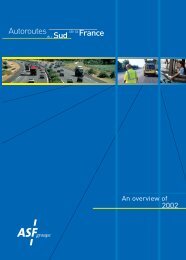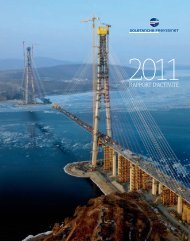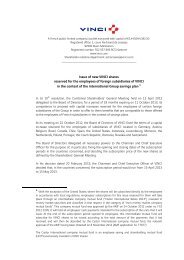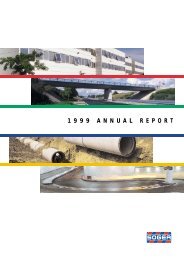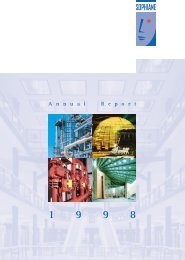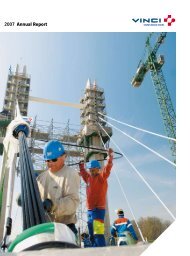VINCI - 2005 annual report
VINCI - 2005 annual report
VINCI - 2005 annual report
Create successful ePaper yourself
Turn your PDF publications into a flip-book with our unique Google optimized e-Paper software.
REPORT OF THE CHAIRMAN<br />
REPORT OF THE CHAIRMAN<br />
ON THE WORK OF THE BOARD<br />
OF DIRECTORS AND ON<br />
INTERNAL CONTROL PRO-<br />
CEDURES, AS REQUIRED BY<br />
THE FINANCIAL SECURITY ACT<br />
Article L. 225-37 of the French Business Code (modifi ed by Article 117<br />
of the French Financial Security Act of 17 July 2003) requires the Chairman<br />
of the Board of Directors of <strong>VINCI</strong> to <strong>report</strong> on:<br />
– how the Board of Directors’ work is prepared and organised; and<br />
– the internal control procedures put in place by the Group.<br />
The Chairman’s <strong>report</strong> on the work of the Board of Directors is given<br />
in paragraph 3 of the Corporate Governance chapter, on page 152.<br />
The section below relates to the internal control procedures.<br />
1. PRINCIPLES GOVERNING CONDUCT AND<br />
BEHAVIOUR<br />
The businesses in which <strong>VINCI</strong> operates require the personnel involved<br />
to be geographically close to customers in order to provide them<br />
promptly with solutions suited to their needs. In order to enable each<br />
profi t centre manager to take the required operational decisions rapidly,<br />
a decentralised organisation has been implemented in each of the four<br />
business lines (Construction, Roads, Energy and Concessions).<br />
This organisation entails delegation of authority and responsibility to<br />
operational staff at all levels.<br />
This obligation is carried out in compliance with the following principles<br />
of conduct and behaviour, to which <strong>VINCI</strong> has resolved to make<br />
a strong commitment:<br />
– rigorous compliance with the rules common to the whole Group, in<br />
particular in respect of delegation (see paragraph 3.3), acceptance of<br />
business (see paragraph 4.1) and fi nancial, accounting and management<br />
information (see paragraph 4.2). These common rules, which<br />
are deliberately restricted in number given the range of the Group’s<br />
activities, must be strictly applied by the staff concerned;<br />
– transparency and loyalty of managers towards their line management<br />
superiors and towards functional departments and the holding<br />
company. In particular, all managers must inform their superiors of<br />
any diffi culties encountered in the performance of their duties (e.g.<br />
with respect to carrying out work on sites, relations with customers,<br />
government departments and suppliers, internal relationships,<br />
personnel management, safety, etc). Although an integral part of operational<br />
managers’ duties is to take decisions alone on matters falling<br />
within their area of competence, any diffi culties encountered must<br />
be handled with the assistance, if necessary, of their line management<br />
superiors or divisional or holding company functional departments;<br />
– compliance with the laws and regulations in force in the countries<br />
where the Group operates;<br />
– responsibility of operational executive managers to communicate the<br />
Group’s principles governing conduct and behaviour to their staff by<br />
appropriate means and to set an example. This responsibility cannot<br />
be delegated to functional managers;<br />
– safety of persons (employees, suppliers, sub-contractors, etc.);<br />
– a culture of fi nancial performance.<br />
Operational and functional managers at all levels, including the highest<br />
within the Group, regularly carry out fi eld visits or specifi c assignments<br />
in order, in particular, to satisfy themselves that these principles are<br />
applied effectively.<br />
169





